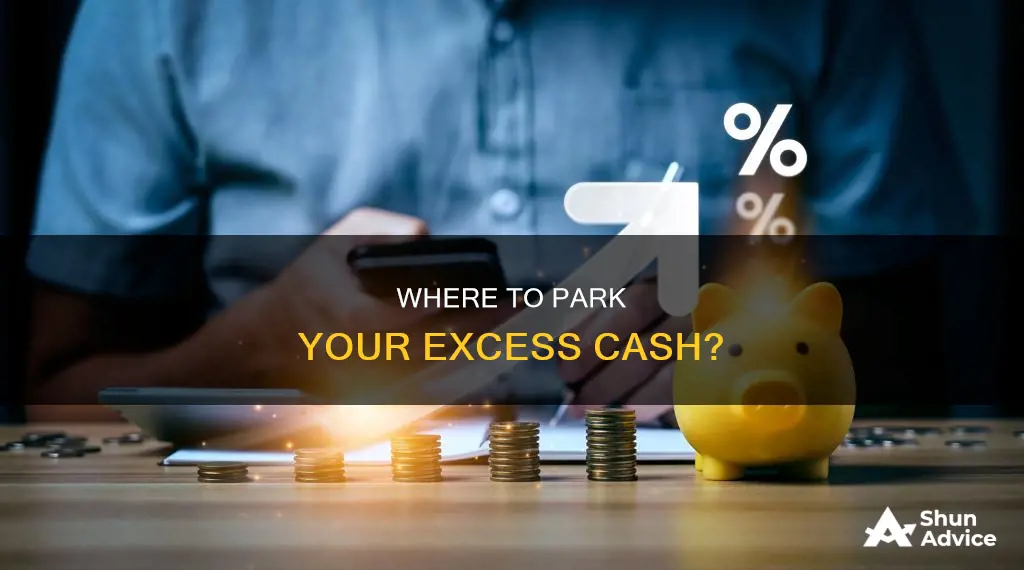
If you have excess cash, it's important to make the most of it. While it can be tempting to splurge on something fun, putting your money into a savings or investment account can be a wiser move.
The best option for you will depend on your personal situation and financial goals. You might want to consider the level of returns you want, how much risk you're willing to take on, and when you will need access to the funds.
- Put it into a savings account, such as a high-yield savings account or money market account.
- Invest it using a brokerage account.
- Increase contributions to a 401(k), 403(b), or IRA.
- Pay off any high-interest debt, such as credit card debt.
- Put it towards other financial goals, such as saving for a house or your children's education.
What You'll Learn

Pay off high-interest debt
Paying off high-interest debt is a great way to make use of excess cash. While it may not be the most exciting option, it is a financially prudent move that can help you achieve long-term financial goals. Here are some reasons why paying off high-interest debt is a good idea:
Improve Your Financial Situation
Paying off high-interest debt can help you save money in the long run. Credit card debt, personal loans, and student loans often carry high-interest rates, and by paying them off, you reduce the overall cost of these debts. This is especially important when interest rates are high or variable, as your debt could become even more expensive over time.
Free Up Cash Flow
By paying off high-interest debt, you free up cash flow that can be used for other financial goals. This excess cash can be invested, saved for emergencies, or used to boost your retirement fund. It can also help you achieve goals such as buying a house or starting a business.
Maintain a Good Credit Score
High-interest debt, such as credit card debt, can negatively impact your credit score, especially if the credit utilization rate is high. By paying off this debt, you can improve your credit score, which will benefit you when applying for loans or credit in the future. Lenders will see you as less risky, and you may qualify for lower interest rates.
Gain Peace of Mind
Reducing high-interest debt can improve your state of mind and relieve stress. It can be overwhelming to owe large amounts of money, and paying off these debts can give you a sense of accomplishment and financial stability. This can also help you avoid legal issues, as tax debt and debt in collections should be prioritized to avoid any legal repercussions.
Stay Motivated
When paying off debt, consider using the debt snowball method, which focuses on paying off the smallest debts first. This method helps you gain quick wins and stay motivated. By seeing progress faster, you are more likely to stick to your debt repayment plan and achieve your financial goals.
How Cashing Investments Affect Debt Service Coverage
You may want to see also

Increase your investment contributions
If you have excess cash and are already free of high-interest debt with comfortable savings, it is a good idea to increase your investment contributions. Here are some ways to do this:
Set Clear Financial Goals
It is important to define your financial goals. Are you saving for retirement, a home, or your child's education? Setting clear and specific goals will give you a target to work towards and motivate you to increase your contributions over time. Break these goals into actionable steps, such as monthly or yearly contribution targets. This structured approach will help you stay focused and make it easier to increase your investment contributions gradually.
Automate Your Contributions
Automating your contributions is one of the easiest ways to increase them. Set up automatic transfers from your checking account to your investment account each month. This "pay yourself first" approach ensures that you consistently invest without being tempted to spend the money elsewhere. As your income grows, consider gradually increasing the amount of your automatic contributions.
Take Advantage of Employer-Sponsored Plans
If your employer offers retirement plans such as a 401(k) or 403(b), contribute at least enough to receive any employer match. This is essentially free money, so take full advantage of it. As your financial situation improves, increase your contributions to take full advantage of the plan's limits. Many plans offer the option to set your contributions to increase automatically each year.
Increase Contributions with Income Changes
Whenever you receive a raise, bonus, or additional income, allocate a percentage of that increase to your investments. This approach allows you to boost your investment contributions without impacting your current lifestyle.
Review and Adjust Your Investments Regularly
Regularly review your investment portfolio to ensure it aligns with your goals and risk tolerance. If your investments are performing well, consider increasing your contributions to take advantage of the success. Conversely, if you notice underperforming investments, evaluate whether reallocating funds or increasing contributions to stronger assets makes sense.
Embrace a Long-Term Mindset
Investing is a long-term endeavour, and market fluctuations are normal. Embrace a mindset that prioritises patience and discipline. By remaining committed to your investment strategy, you will find it easier to increase your contributions consistently over time.
Seek Professional Advice
If you are unsure about how to increase your contributions or structure your investments, consider seeking advice from a financial advisor. They can provide personalised guidance based on your financial situation and help you develop a plan to maximise your contributions and returns.
Understanding a Firm's Cash Flow from Investing Activities
You may want to see also

Invest in yourself
Investing in yourself is one of the best investments you can make. This could mean saving for your education or that of a family member. A 529 plan is a tax-advantaged investment vehicle that grows tax-deferred and remains tax-free as long as the funds are used to pay for qualified educational expenses.
If you have entrepreneurial dreams, another way to invest in yourself is to use your excess cash to jump-start your business and turn your dreams into reality. Using your excess cash will reduce the amount of business loans you need as you start and grow your company.
You could also consider investing in your health. For example, you could use your excess cash to contribute to a health savings account (HSA).
Understanding the Ideal Cash-to-Investment Ratio for Your Business
You may want to see also

Consider the timing
When deciding where to put excess cash in an investment account, it is important to consider the timing. The timing of when you receive a cash surplus can affect what you decide to do with the money. For example, if you receive an inheritance after a loved one dies, it is probably an emotional time, and you should take your time and perhaps put the money aside until you feel ready to make decisions about it. Interest-bearing accounts, including money market accounts or certificates of deposit (CDs), can be a good option for short-term savings.
You can also assess your budget against any upcoming large expenses. For instance, if you pay your car insurance every six months, you could use the extra cash to get ahead of those payments. Similarly, if you have any high-interest debt, such as credit card debt, it is a good idea to pay this off first.
Another factor to consider is the current state of the market. Instead of obsessing over the perfect timing for your trades, stay focused on your end goal: actually getting invested. Missing out on only a few days of market gains can make a big difference to your portfolio's long-term returns. In fact, historically, investing during bad times has provided some of the best subsequent returns.
Investing Excess Cash: Strategies for Smart Financial Planning
You may want to see also

Put it in a savings account
If you have excess cash, it's important to put it to good use. While it may be tempting to splurge on something fun, putting your money into a savings account is a smart strategy. This allows you to treat yourself a little, while also keeping the rest of the money safe and giving it time to grow.
A good first step is to ensure you have an emergency fund. Financial experts recommend keeping between three and six months' worth of household expenses in a high-yield savings account. This will ensure you have a supply of cash to cover any unexpected costs, such as medical bills or home repairs.
Once you have your emergency fund in place, you can start to think about investing your excess cash. A brokerage account is a popular choice for non-retirement investments. These accounts have no income restrictions or funding limits, and the assets can be used for any purpose at any time without early withdrawal penalties. You can also consider putting your money into a 401(k) or IRA, or investing in stocks, bonds, or real estate.
If you're unsure about what to do with your money, it's a good idea to speak to a financial professional. They can help you clarify your financial goals and create a plan to achieve them. It's also important to remember that investing involves risk, and there is always the possibility of losing money.
Pension Plans: Cash, Investments, and Your Retirement Future
You may want to see also
Frequently asked questions
A brokerage account is a good option for non-retirement investments. There are no income restrictions or funding limits, and you can use the money for any purpose without early withdrawal penalties.
You could increase contributions to a 401(k), 403(b), or IRA. You could also consider paying off debt, such as credit card debt, or investing in yourself, for example, by saving for your education.
Make sure you have an emergency fund in place, typically three to six months' worth of household expenses. You should also consider consulting a financial professional to determine the best strategy for your specific situation.
Don't get caught up with current market conditions. Instead, focus on time in the market, rather than timing the market.







